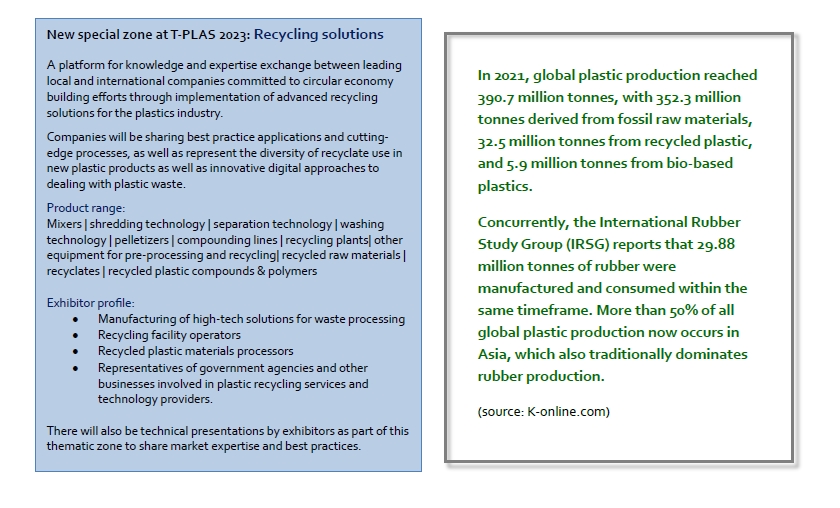T-PLAS 2023: Challenges and Opportunities in the Evolving Landscape of Plastics in Southeast Asia
T-PLAS 2023 | 20-23 Sep @ BITEC, Bangkok - Special zone on ‘Recycling Solutions’ will feature innovative machinery to high-tech solutions
Plastics are omnipresent in nearly all sectors of our living environment today and presents a complex and dynamic landscape of challenges and opportunities. With the increasing demand for plastic products and packaging, coupled with the urgent need for sustainable solutions, this has led to a renewed focus on recycling and the adoption of biodegradable alternatives. While these changes have sparked innovation, they have also brought about new challenges, such as the need for advanced processing and sorting technologies, the development of new materials, and the establishment of efficient recycling infrastructures.
Navigating these challenges requires a multidimensional approach that involves collaboration across the value chain. Policymakers, industry leaders, and consumers must work together to establish clear guidelines and promote responsible production, use, and disposal of plastic materials. Companies must also invest in new technologies and research to develop new materials and improve the efficiency of the recycling process. Amidst these challenges, there are also opportunities for growth and innovation. Companies that can adapt to the changing landscape and develop sustainable solutions that meet consumer demands and regulatory requirements will be well-positioned for success. T-PLAS 2023 brings this front and centre with the introduction of a special focus zone - Recycling Solutions.
T-PLAS 2023 and a special focus zone - Returning to Bangkok after a 4-year pandemic induced hiatus, T-PLAS 2023 will bring together manufacturers, producers and industry experts serving the plastics and rubber value chain from around the world, including national pavilions and country representation from Austria, China, Germany, Italy, Singapore and Taiwan. The Recycling Solutions zone is set to be a highlight, from featuring customised and innovative recycling solutions, size reduction equipment, to the latest machinery and intelligent technologies - the zone comes against the backdrop of Thailand’s strength as a location for the production of bio-based plastics. Driven by demand in Thailand’s robust domestic economy, the essential trade fair continues to strengthen its role as a leading hub of plastics and rubber manufacturing with a greater emphasis on technology, advanced products and solutions. T-PLAS 2023 is synergistically co-located with PACK PRINT INTERNATIONAL and Corrutec ASIA serving the packaging, printing, corrugated packaging technology sectors, as well as four other trade fairs; wire and Tube Southeast Asia, GIFA and METEC Southeast Asia.
Southeast Asia and the circular economy - Rapid urbanisation and industrialisation have transformed the Southeast Asian bloc into a production and consumption powerhouse with an increasingly prosperous population. However, the current plastics economy is generally a cycle of take, make and waste, and is unsustainable. By design, a circular economy is restorative and regenerative which means materials constantly flow around a ‘closed loop’ system, rather than being used once and then discarded. In the case of plastic, this means concurrently keeping the value of plastics in the economy, while being sustainable and environmentally friendly. According to an ASEAN policy brief on the circular economy, the transition is crucial for ASEAN to attain the ASEAN Community Vision 2025 of “vibrant, sustainable, and highly integrated economies”.
Looking at Asia as a whole, by virtue of its role in global supply chains and its massive consumer market, it is expected to be a key source of demand for plastics and a potential showcase for the circular economy in action. It is evident that investing in the circular economy in Asia presents substantial investment opportunities for growth and development. The region has the potential to build up a resilient recycling and waste management industry and accelerate the world's transition toward circularity. As the relationship between plastics and society is evolving, focus is gaining momentum on designing products to minimise waste, along with repurposing, reuse or recycling. This requires innovation throughout the plastic value chain, from new alternative materials and sustainable packaging to plastic-smart designs.
Asia: Moving towards sustainability and transforming the ways plastics are produced and used
As a single market, Southeast Asia is very attractive for key industries, including automotive, packaging, construction and medical devices. The region is embracing salient issues relating to fuel efficiency, through development of its electric vehicle industry; plastics waste reduction through a recycling infrastructure; and adoption of smart manufacturing via Industry 4.0 initiatives. Southeast Asia’s plastics market is expected to register a CAGR of 5.5% through to next year, according to a report by Mordor Intelligence. Construction and packaging industries are the major consumers of plastics in as are film/sheet applications. Demand for recycled plastics is strong, and appealing price premiums for recycled material can make the economics attractive for the entire value chain to invest to collect and process plastic waste material to produce high-quality circular plastics.
For more information about exhibiting or visiting T-PLAS 2023, go to: www.tplas.com


















